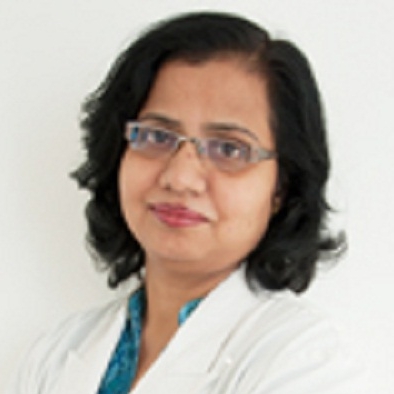
DR JYOTI SEHGAL
Neurologist
- Fees: INR 1,000
-
Tuesday 10:00 AM - 4:00 PM
(See all timing)Tuesday 10:00 AM - 4:00 PM,
Wednesday 10:00 AM - 4:00 PM,
Thursday 10:00 AM - 7:00 PM,
Friday 10:00 AM - 4:00 PM,
Saturday 10:00 AM - 4:00 PM 10% Off on OPD + Free Registration
Introduction
Dr. Jyoti Sehgal is one of the best Neurologists in Delhi. Dr. Jyoti Sehgal ot her clinical Neurology skills from Dr. JMK Murthy, Hyderabad. Her field of interest is Stroke, Electrophysiology and critical care in Neurology. Dr. Jyoti Sehgal has been pioneer in getting stroke code activation at Medanta wherein she believes that managing stroke patients is actually a team work in which all different specialities work under one roof. Dr. Jyoti Sehgal has keen interest in Electrophysiology wherein Neuropathies, Brachial Plexus injuries and muscle disorders are diagnosed. Her critical care interest has helped in designing various protocols for Emergencies in Neurological disorders.
Hospital Associations
Medanta- The Medicity, Gurugram
Services/Interest
- Stroke Management
- Critical Care in Acute Neurological
- Emergencies Electrophysiology.
Experience
Dr. Jyoti Sehgal is one of the best Neurologists in Delhi and has an experience of 9 years in this field.
Education
Dr. Jyoti Sehgal has completed her D.N.B. (Neurology) from CARE Hospitals and Institute of Medical Sciences, Hyderabad in 2008, M.D. (General Medicine) from Mahatma Gandhi Institute of Medical Sciences, Sewagram, Wardha, Maharashtra in 2002 and M.B.B.S from Mahatma Gandhi Institute of Medical Sciences, Sewagram, Wardha, Maharashtra in 1997.
I Speak
English , Hindi
Feedback For Dr Jyoti Sehgal
Write FeedbackMedanta The Medicity Gurugram Timing
Tuesday
10:00 AM - 4:00 PM
Wednesday
10:00 AM - 4:00 PM
Thursday
10:00 AM - 7:00 PM
Friday
10:00 AM - 4:00 PM
Saturday
10:00 AM - 4:00 PM
Medanta Mediclinic Cybercity Timing
Monday
12:00 PM - 4:00 PM
What is a neurologist?
Neurology is the branch of medicine that focuses on study and treatment of disorders of the nervous system. A neurologist is a physician who specializes in treating diseases of the nervous system which is made of two parts: the central and peripheral nervous system. It includes the brain and spinal cord.
Before neurologists can practice, they must:
- Graduate from medical school
- Complete an internship
- Receive 3 years of training in a Neurology residency program.
What are the diseases treated by the neurologists?
- Stroke and Neurological trauma
- Tumors of the nervous system
- Infections of the nervous system
- Multiple sclerosis and other autoimmune diseases
- Epilepsy and Headaches
- Peripheral nerve disease
- Neuromuscular diseases
- Dementia
- Movement and Sleep disorders
When should you go and see a neurologist?
A person should go and see a neurologist if he is suffering from:
- Severe headaches and chronic pain.
- Dizziness, numbness or tingling.
- Chronic weakness.
- Problems with movement and vision problems.
- Seizures
- Difficulty in thinking and sleep problems.
What tests are done by a neurologist?
Tests performed by neurologists are Neurological Diagnostic Tests, Brainstem Auditory Evoked Response (BAER) Test, Carotid Duplex (Carotid Ultrasound), Cerebral Angiography (Also Called Vertebral Angiogram or Carotid Angiogram), Computed Tomography (CT or CAT scan), Discography, Doppler Ultrasound, Electroencephalogram (EEG), Electromyography (EMG), Intrathecal Contrast Enhanced CAT Scan, Lumbar Puncture (Spinal Tap), Magnetic Resonance Imaging (MRI), Magnetic Resonance Angiogram (MRA)/Magnetic Resonance Venogram (MRV), Myelogram, Nerve Conduction Study, Oculoplethysmography (OPG), Positron Emission Tomography (PET) Scan, Selective Nerve Root Block, Single Photon Emission Computed Tomography (SPECT) Scan, and Somatosensory Evoked Response (SSER) Test.
What is the difference between neurologist and psychiatrist?
Neurological practice relies on the field of neuroscience, the scientific study of the nervous system while psychiatry is the medical specialty devoted to the diagnosis, prevention, study, and treatment of mental disorders. A neurologist is a physician specializing in the treatment of exogenous (organic) disorders that are caused by organic brain damage, and psychiatrist is a physician that treats endogenous disorders that are not attributable to any external or environmental factor. They are due to biological, physiological, genetic mental reactions, states, and development, which is caused by the internal constitutional disorder.
How to prepare for your first appointment with a neurologist?
Write down the symptoms and other health information, including medications, previous illnesses, allergies, and your family's history of the disease. Make a list of your questions. Have the previous test results sent in advance, or take them with you. Don't be hesitant to ask questions if you're confused about something. Make sure you understand the diagnosis and treatment and any further steps that have been suggested you need to take.
